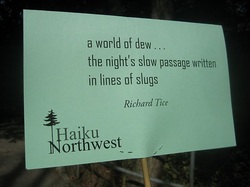
Let's hear what he has to say as I do a blog interview with him...
How long have you been involved in haiku poetry and what got you started?
I started writing haiku seriously in 1977 during my second stay in Japan. Oddly enough, I never encountered haiku during my first stay of two years on Japan, but I was introduced to it later in a Japanese civilization course in 1975. This introduction soon developed into a primary area of study for me, although in my field of comparative literature I also took courses in all types of Japanese literature. In 1978 Bonsai, Modern Haiku, and Dragonfly began publishing some of my work. Then the Haiku Museum of Tokyo asked me to translate a short collection of contemporary Japanese haiku, which they published in 1979, and I started writing quite a few articles on haiku for Modern Haiku, Frogpond, and Cicada. I took over Dragonfly from Lorraine Ellis Harr in 1985 and published fifteen issues before giving it up in. My Japanese editor, Jack Terahata, and I translated a lot of contemporary Japanese haiku for that magazine to go along with the English-language haiku. My first haiku collection, Station Stop, was published in 1986 and won second place in the HSA biennial book award contest (back then the awards were given every two years). After Dragonfly ceased publication, I stopped writing for many years, except for an occasional haiku now and then. When I returned to graduate school at SFSU in 2003, I again got immersed in Japanese literature, particularly linked verse, and started writing haiku more, along with some linked verse. Michael Welch got me out of my shell by inviting me by e-mail to a haiku reading in the Bay Area. By coincidence, I had just moved to the Puget Sound, where he had moved earlier, and he got me involved in haiku activities in this area. I finally got to meet many haiku poets and scholars I had only known by name. My second collection of haiku (and linked verse), Familiar and Foreign, was published in 2008. It's received several complimentary reviews and absolutely no fanfare.
Have you ever been to HNA before?
This conference will be my first HNA conference. It's got a great line up, including Jim Kacian's presentation on the history of one-line haiku in English, which he's giving at the same time as my presentation. My lecture is titled "Location, Location, Location: Place in Haiku." Other aspects of haiku--kigo, syllable count, caesuras, lineation, imagery, for example--have gotten far more attention and have been hotly debated, but place may be more critical or basic to haiku than those. Can you imagine a haiku not linked to a place in some way? I did find one in the most recent issue of Modern Haiku. I'll review the rule of incorporating place in hokku in linked verse sessions and look at the two most common ways place is used: as a generic location for haiku and as a fixed, specific location. Then I'll examine haiku that use place names, a practice that is common enough in Japanese haiku but much less common in English. Finally I'll cover a fourth category of haiku that are "tagged" in some way--the place is indicated outside of the haiku, almost like adding a line to the poem. This is fairly rare in English haiku, but fairly visible in Japanese haiku.
You said you moved to this area some time ago. How do like it?
I moved to Maple Valley in 2008 and then to Kent last year. Both are southeast of Seattle. I think the Puget Sound is stunningly beautiful, and Seattle is a natural for a haiku convention. I've been to Seattle many times in the past, including taking a class at the University of Washington when I lived in Olympia and staying in Seattle for several months before moving to Japan. There are so many interesting places to see, and the city, despite its share of skyscrapers, has never lost its connection to the sea, the forests, and the mountains.
What are you looking forward to at this year's HNA?
I'm excited to finally meet many whose names and work I've been familiar with for years. I'm looking forward to haiku immersion!
I am excited too! Thanks for sharing, and I'll see you soon!
 RSS Feed
RSS Feed
